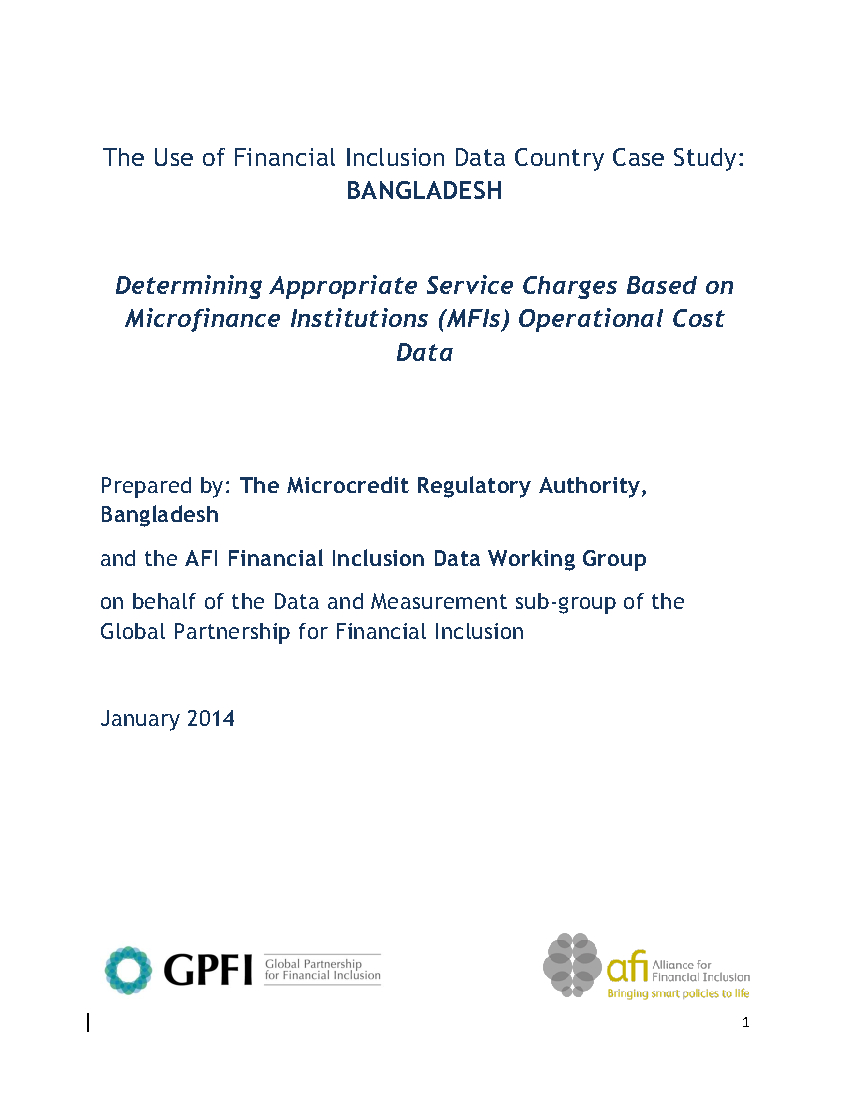The Use of Financial Inclusion Data: Country Case Study of Bangladesh
Determining Appropriate Service Charges Based on Microfinance Institutions (MFIs) Operational Cost Data
Prepared by: Microcredit Regulatory Authority (MRA) of Bangladesh and the Alliance for Financial Inclusion (AFI) Financial Inclusion Data Working Group (FIDWG) on behalf of the Data and Measurement sub-group of the Global Partnership for Financial Inclusion (GPFI).
The Microcredit Regulatory Authority (MRA) of Bangladesh was concerned about the high interest and service charges set by MFI’s on consumers. They set out to develop a framework to protect consumers, while at the same time enable MFI’s to operate sustainably. The study describes the data gathering, the consultative process and the support provided in setting a fair and consistent rate. This policy is monitored regularly and continues to show compliance by MFI’s, improved efficiency in MFI operations and greater benefit to the end consumers.
Introductory Note to Case Studies on the Use of Financial Inclusion Data
The GPFI has recognized the importance of reliable data on which to base informed financial inclusion policies and interventions since its inception. The Data and Measurement sub-group gave substance to this by providing a framework for data collection, encapsulated in the initial G20 Basic Set of financial inclusion indicators, subsequently expanded to the more holistic G20 Financial Inclusion Indicators. These indicators capture the financial inclusion dimensions of access, usage and quality of service provisioning, both for individuals and for small enterprises. Using existing data to populate the indicators has provided a solid basis for countries to assess the state of financial inclusion and focus national data collection efforts.
The objective of driving financial inclusion forward has resulted in a focus on financial inclusion targets, at both global and national levels. As indicators of financial inclusion are crucial to an informed approach to targets (and policy formulation in general), the Data and Measurement sub-group developed an approach to target setting based on financial inclusion archetypes and a note on global and national targets and what each of these should focus on. During this work it became apparent that there is neither a single approach to policy formulation and target setting that is applicable to all countries nor an ideal model that all countries can benchmark themselves against and set policies and targets accordingly. Each country is unique, with a specific set of circumstances, priorities and capabilities to deal with in the national policy framework of the country. The golden thread linking successful policy interventions would appear to be the use of the indicators, supplemented with relevant data on specific issues or areas of focus, informing financial inclusion policy makers on actions, policies and targets.
Click here to access the entire Introductory Note

 About
About
 Online
Online
 Data
Data




















